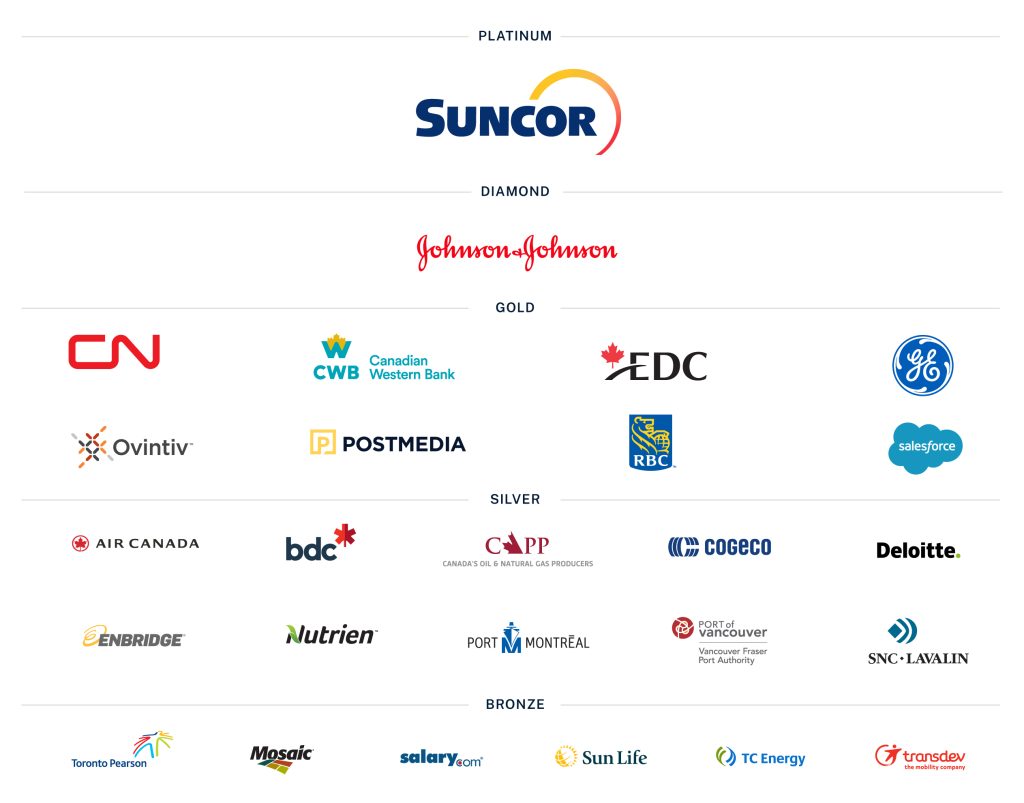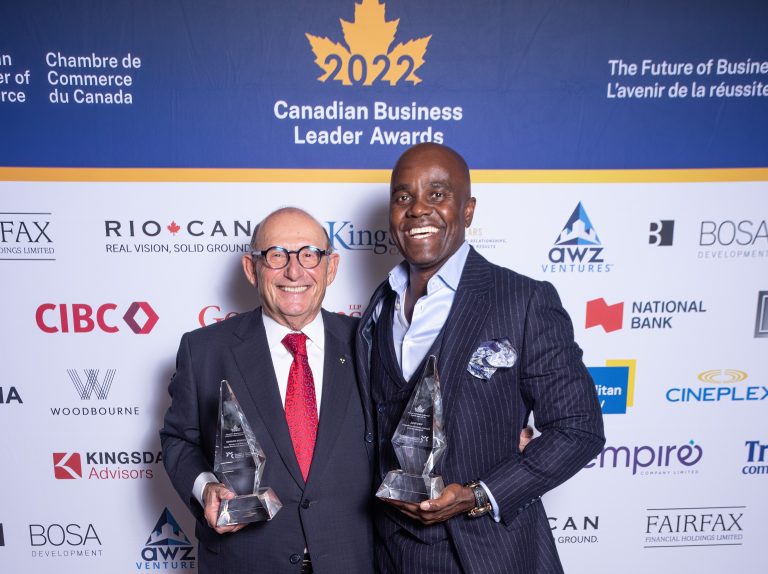Blog /
Highlights from our Executive Summit Series 2022
Highlights from our Executive Summit Series 2022
This series has allowed us to take a deep dive into issues our political leaders need to consider to ensure...

This series has allowed us to take a deep dive into issues our political leaders need to consider to ensure public policies drive business success.
Over the course of this year, we have explored five sectors as part of our series: Critical Minerals, Health and Life Sciences, Canada-U.S. Relations, Artificial Intelligence and most recently, Environmental, Social and Governance (ESG).
Each event has ignited insightful conversations with some of Canada’s most influential business leaders and government officials, as we strive to meet our biggest challenges: the future of people, technology, trade and climate.
For a summary of the series’ biggest lessons and takeaways, read on!
To watch sessions from our series on-demand, click here.
Executive Summit on Critical Minerals | February 23

In our first Executive Summit, we discussed how critical minerals are vital to our country’s economic success. The first panel highlighted the importance of critical minerals to achieving Canada’s Net-Zero future and the second examined Canada’s comparative trade and development advantages.
Featured Guests:
- Hon. Jonathan Wilkinson, Minister of Natural Resources
Panel Discussion: Critical Minerals and Canada’s Net-Zero Future
- Moderator
- Scott MacKenzie, Senior National Manager of External Affairs, Toyota
- Panellists:
- Chris Doornbos, President and CEO, E3 Metals Corp.
- Stephane Leblanc, Managing Director, Rio Tinto Iron and Titanium
- Kunal Phalpher, Chief Strategy Officer, Li-Cycle
Panel Discussion: Canada’s Sustainability Advantages and Challenges
- Moderator
- Katie Fedosenko, Manager, Sustainability Innovation, TECK
- Panellists
- Sarah Fedorchuk, Vice-President, Government and Public Affairs, The Mosaic Company
- JP Gladu, Founder, Mokwateh
- Pierre Gratton, President and CEO, The Mining Association of Canada
Key Takeaways:
- The World Bank is predicting the need for a 500% increase by 2050 in the production of minerals like graphite, lithium and cobalt to fuel the energy transition – Canada is a top producer of some of these minerals in the world.
- Over 120 countries have committed to Net-Zero by 2050, which means:
- Global energy systems need to undergo fundamental change.
- There will be a significant demand for critical minerals.
- Canada must execute an effective critical minerals strategy.
- Vital for reinforcing the country’s global brand as a secure and sustainable supplier for domestic and international markets.
- Help facilitate investments that are required to expand national critical minerals stockpiles and supply chains.
- Canada must increase domestic production and processing of critical minerals through:
- Instilling thoughtful policy.
- Leveraging resource wealth to create jobs while acknowledging responsibility to protect the world around us.
- Canada should seize the opportunity to build a whole industry within the critical minerals movement with vertical integration in the country.
- The country has a big role to play in the de-globalization in the supply chain.
- Canada’s habit right now is to ship the raw material to Asia and Europe and buy it back, but we need to build these things locally.
- JP Gladu shared how there can be a large disconnect between people, the markets and our sectors, GHD reductions and Net-Zero.
- An example is China, who is a huge producer of batteries by using coal, and yet our world rewards this by buying into their supply chain.
Top Practical Tips for Business:
- Ensure that companies are working with Indigenous communities where mines are being proposed.
- Think about critical environmental issues that need to be addressed at the front-end, which can help us to get the license we need to ensure we can complete these projects in a sustainable way.
- Speed is key in our commitment to Net-Zero – it’s a competition between other countries and we need to work together to see how we can develop other processes and products quickly.
- Companies need to force a culture change internally and get the leadership team, workforce and local communities to buy into the importance of change.
Canada’s natural resources can, must and will provide a foundation for a cleaner and more prosperous future as we grapple with the impacts of a changing climate.
Hon. Jonathan Wilkinson, Minister of Natural Resources
You must care, believe and then do it.
JP Gladu, Founder, Mokwateh
Executive Summit on The Path to Pandemic-Proof: What the Health and Life Sciences Ecosystem Needs Today | April 13

Our second Executive Summit featured two panel discussions led by prominent figures in the Canadian health and pharmaceutical sectors. They discussed how Canada can create an ecosystem approach for the life sciences industry and how the sector can work towards greater pandemic resiliency.
Featured Guests:
- Min. Jean-Yves Duclos, Minister of Health
- Gordon McCauley, President & CEO, adMare BioInnovations
Panel Discussion: Improving the Performance of our Health Systems
- Moderator:
- Jodi Butts, Senior Governance Consultant, Watson Advisors, Inc.
- Panelists:
- James Brodie, General Manager, Canada, Johnson & Johnson Medical Devices Companies
- Andrea Marazzi, Country Pharma Organization Head, Novartis Pharmaceuticals Canada
- Dr. Jenisa Naidoo, Chief Scientific Officer, Dynacare
1:1 Video with GSK | Watch Here
Panel Discussion: Positioning Life Sciences as an Economic Growth Vector
- Moderator:
- Frank Béraud, CEO, Montréal In-Vivo
- Panelists:
- Pamela Fralick, President, Innovative Medicines Canada
- Andrew MacIsaac, CEO, Applied Pharmaceutical Innovation
- Marina Massingham, CEO, Aifred Health
Key Takeaways:
- COVID-19 has made our system even more vulnerable and fragile.
- Historically people have thought about healthcare as an expenditure, but there is a huge investment piece to it.
- Because of COVID-19, Canadians are better understanding the value of science, research and development, biomanufacturing, etc.
- Ways that the life sciences sector can help the healthcare system recover:
- Ensure there are more convenient touchpoints for people – bring healthcare closer to people’s homes.
- Tap into better technology and invest in greater digitization of the system.
- Advocate with government to look for division of labour solutions – need to address health human resources.
- Must build a policy framework that encourages the translation and scale up of companies here within Canada from both direct investments from government as well as policy.
- Some form of funding is needed as access to capital is difficult.
Top Practical Tips for Business:
- We need to be more resilient in our capacity to adapt to these new health shocks by investing in:
- Greater ability to manage and share data.
- Greater investments in governance of how we handle these shocks.
- Increased infrastructure and innovation.
- Look at operational plans and match supply with demand, which will create a better patient outcome and experience.
- Ensure the life sciences sector evolves based on the lessons learned through this pandemic.
Integration of data and collaboration is critical going forward – the bar on this is very high. Issues such as patient privacy and cyber security is paramount to this discussion and we have an obligation to get it right.
James Brodie, General Manager, Canada, Johnson & Johnson Medical Devices Companies
Agility and speed are the new basis for differentiation.
Dr. Jenisa Naidoo, Chief Scientific Officer, Dynacare
Executive Summit on Re-Orienting Canada-U.S. Relations Towards Mutual Economic and National Security | May 18

Our third Executive Summit featured two panel discussions: the first panel focused on strengthening the continental defense industrial base, which focused in particular on the modernization of the North American Aerospace Defense Command (NORAD). The second panel examined how businesses can successfully navigate Canada-U.S. relations in the current period of trade protectionism and great-power politics.
Featured Guests:
- The Honourable Anita Anand, Minister of National Defence
Panel Discussion: Strengthening the Continental Defence Industrial Base
- Panellists:
- Kevin Ford, CEO, Calian
- Nicolas Todd, Vice President, Government Relations and Communications, CADSI
- Stephen Hampton, Director, Public Policy and Government Affairs, Telesat
Panel Discussion: Navigating Canada-U.S. Relations In an Era of Trade Protectionism & Great Power Politics
- Moderator:
- Sam Boutziouvis, Vice-President, Government Relations & Multilateral Development Institutions, SNC-Lavalin; Co-chair of the Canadian Chamber’s International Affairs Committee
- Panellists:
- Candace Sider, Vice President, Government and Regulatory Affairs, Livingston International
- Prof. Meredith Lilly, Associate Professor and Simon Reisman Chair in International Economic Policy, Carleton University
- Mike Gladstone, Director, External Affairs, Canada, Enbridge
Key Takeaways:
- Canada needs to demonstrate how our contributions are relevant to U.S. security interests.
- In terms of what a 2% world would look like, there is skepticism in the ability to get the defense industry to the streets both in engagement and procurement.
- Four important tactics were discussed to ensure successful NORAD Modernization including:
- Develop a comprehensive strategy that includes clear, industrial targets.Consult industry and ensure they have a seat at the table.Create a Canadian community of interest and determine which companies have experience against these capabilities by having an ITQ.
- Connect Canadian capability with government, military and supply chains and ask how to allow Canadian companies to build relationships with American companies.
- The current state of Canada – U.S. relations pose challenges that are just as bad if not worse under the Biden administration.
- American protectionism is strong (republicans and democrats alike), which has the same sentiment as the Trump administration.
- The goal of the U.S. administration is to make foreign investment and manufacturing outside the U.S. unattractive in many ways – ensuring they keep these jobs within the country.
- The Russian war on Ukraine has had a huge impact on the energy crisis for North America – inflationary impacts, lack of access to energy and a crisis for European allies – it’s not about price, it’s about having access to it.
- Canada does not have the infrastructure, so we must work with the U.S. to produce the energy and build the infrastructure.
- We need to fight Buy America and build Team North America.
- Canada can’t jeopardize our relationship with the U.S. by pushing their buttons through engaging with China – must look to countries such as South Korea, Japan, India, etc.
Top Practical Tips for Business:
- Getting a clear idea of what already exists and where the next generation of technology is going is essential to Canada’s security and defense success.
I hope it doesn’t need a crisis to always have the procurement system be responsive. It is not just a government issue, it’s defense as well.
Kevin Ford, CEO, Calian
Back logs introduce additional consequences during a critical time when we are working on economic recovery. This needs to be top of mind in terms of a comprehensive, strategic plan. The time is now.
Candice Sider, Vice President, Government and Regulatory Affairs, Livingston International
Executive Summit on The Future of Responsible Artificial Intelligence (AI) | June 8

Our fourth Executive Summit highlighted how responsible AI can empower employees and businesses, and when used properly, can ensure the longevity of Canada’s economy. The event featured discussions that took a closer look at issues pertaining to AI and how “responsibility and trustworthiness” can be intrinsic parts of the AI journey.
Featured Guests:
- Catherine Luelo, Chief Information Officer of Canada, Deputy Minister at the Treasury Board of Canada Secretariat
- Mehdi Merai, Partner, Omnia-AI/Artificial Intelligence and Data, Leader of the AI Factory, Deloitte
Panel Discussion: Responsibility and Trustworthiness in AI
- Moderator:
- Farshad Abasi, Chief Security Officer, Forward Security
- Panellists:
- Julien Billot, CEO, Scale AI
- Nidhi Hegde, Fellow and Canada CIFAR AI Chair, Amii (Alberta Machine Intelligence Institute)
- Shahram Tafazoli, Chief of AI, Weir Motion Metrics
- Brigitte Nolet, Incoming President and CEO, of Roche Canada Pharma
Key Takeaways:
- Measuring success in AI refers to driving a different outcome and being able to automate something you couldn’t before.
- Factors associated with the difference in challenges for implementing AI in government versus private sector:
- Scale is a factor.
- Different risk profiles between private enterprise and government – in government, there is less comfort with prototyping, failing and trying something – this bias towards not taking risk doesn’t lend itself to this type of technology.
- Speed of implementation – government focuses on process, whereas private sector focuses on outcomes.
- Because AI uses passive data, there needs to be a national conversation about how we educate people to be apart of a digital democracy, so peoples’ privacy is properly protected.
- An important limitation of AI: the fairness and biases with respect to different demographics or groups.
- There are multiple classes within race, age, gender, etc. and the outcome is not equivalent among different demographics.
- Government plays a crucial role on the delivery of trustworthy AI.
- The private sector needs to bridge this gap so government can understand the evolution of the technology.
- There is a shared responsibility between AI designers and users for the consequences of AI.
Top Practical Tips for Business:
- One of the most difficult skills for organizations to master: to stop something that is not deriving the outcomes you’re looking for – this takes courage, but it is necessary.
- Do not underestimate the change management and the talent – data is a huge strategic asset for an organization and AI is the icing on the cake.
- Important to move out of manual manipulation of data into automated.
- There is a big issue of skills – we have talented people, but just not enough of them.
- Data and cyber space are hot labour markets – think about where adjacent skills can be re-trained.
AI is one of the most transformational technologies – it is not new, it’s been around for 25+ years.
Catherine Luelo, Chief Information Officer of Canada, Deputy Minister at the Treasury Board of Canada Secretariat
The system is only as good as the data you’re feeding it.
Farshad Abasi, Chief Security Officer, Forward Security
Executive Summit on Environmental, Social and Governance (ESG) Considerations | October 26

At our fifth and final Executive Summit on ESG Considerations, we discussed growing investor expectations on ESG disclosure, the challenges and opportunities in integrating ESG into businesses’ core operations and how strategy rooted in strong sustainability tactics create opportunities for continued growth.
Featured Guests:
- Robert (RJ) Johnston, Special Advisor for Energy and Climate, Eurasia Group
1:1 Spotlight: Faith Goodman, CEO, Goodman Sustainability Group, Founder VeriStell Institute and Sean Mallen, former Global News European Bureau Chief | Watch Here
Panel Discussion: Integrating ESG into Operations
- Introduction:
- Justine Hendricks, Chief Sustainability Officer, EDC
- Moderator:
- Kent Kaufield, Sustainability Leader, EY
- Panelists:
- Troy McDonald, Assistant Treasurer and Risk Management (Sustainability), Tourmaline Oil Corp
- David Connelly, VP Strategy and Corporate Affairs, Vital Metals
- Elizabeth Alves, VP Enterprise Strategy and Sustainability, Cogeco Inc
- Lisa Marcuzzi, VP, Head of Corporate Affairs, Legal and ED&I, ArcelorMittal Dofasco
1:1 with Arthur Nicolet, CEO, Transdev Canada | Watch Here
Panel Discussion: Sustainable Finance in Canada
- Moderator:
- Sandra Odendahl, SVP and Head of Sustainability and Diversity, BDC
- Panelists:
- Marie-Justine Labelle, Head of Responsible Investment – Retail, Desjardins
- Nicole Vadori, VP and Head of Environment, TD Bank Group
- Yvan Deschamps, EVP and CFO, Laurentian Bank
- Steve Robins, Head of Strategy, Canada Infrastructure Bank
Key Takeaways:
- The war in Europe has global implications – there are economic and energy consequences.
- Oil and gas will need to continue a path to Net-Zero.
- Focus on shareholder engagement versus divestment emerging in a context of high energy prices.
- Clean tech and electricity should expect new ESG scrutiny on supply chains from GHG-intensive suppliers in countries with shaky human rights/labour records.
- ESG is crucial to a business’ long-term success as investors and consumers alike are demanding companies evaluate ESG (the non-financial requirements) in addition to financial requirements.
- Consumers are willing to pay more for environmentally responsible companies.
- People want to work for companies that take ESG seriously – personal values aligning with the company’s.
- ESG strategies need to be robust – important to execute on what you’re saying otherwise reputational damage could be punitive.
- Asset managers are looking to meet investor expectations for sustainable products, services and advice, lenders insisting on sustainability in their portfolios and both of them looking to how these translate into new finance opportunities.
Top Practical Tips for Business:
- Businesses need to be a consensus builder – you must take a lot of differing views and figure out what will work best for the company.
Each of the parts of ESG are inextricably linked and you have to execute across all three of them.
David Connelly, VP Strategy and Corporate Affairs, Vital Metals
Thank You to Our Critical Minerals Event Sponsor

Thank You to Our Health & Life Sciences Event Sponsors

Thank You to Our Canada-U.S. Relations Event Sponsors

Thank You to Our Responsible Artificial Intelligence Event Sponsors

Thank You to Our ESG Considerations Event Sponsors

Thank You to Our Excellence Level Sponsors

Related News

Employee Education is a Critical Defence Against Cyber Attacks

How Your Organization Can Quantify and Reduce Your Cyber Risk




